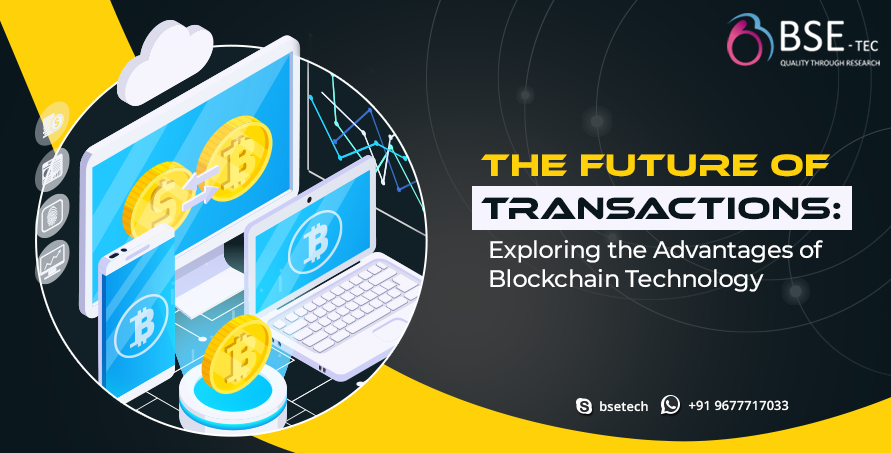The Future of Transactions: Exploring the Advantages of Blockchain Technology

How fast has the world transformed from physical coins to paper notes and quite now digital transactions via UPI and net banking, Ever thought about the future of transactions alongside technology? Yeah, Blockchain in Fintech is more futuristic providing a secure mode of transactions.
Making Better with Blockchain
The traditional pattern of fintech when a user opens an account or avail of a loan in any bank, manually records data personal info, account info, and value details can lead to a high chance of data mismatch and time consumption. Also when users transfer money to another account banks maintain challans, and written transaction IDs may go wrong at times not all the time, Specifically need to be aware of theft or fraud. Even though we have instant UPI transactions, they are all CENTRALIZED and put a dent in all the transactions if the server is down! Using technologies such as blockchain in fintech reduces the risk of data handling, more secure, transparent, immutable transactions and most importantly zero downtime.
Why does Fintech adopt Blockchain?
Recently banks have been trying to keep their customers’ records and transactions secured, by adopting digital technologies and other fintech advancements leading to an eye-opening digital transformation from traditional payment systems into Mobile banking /Online banking. Banking is a century picture for customers providing multiple economic, and financial activities which include lending, trading, transaction settlement, payment processing, etc. As banking has become the most important part of our
A Sample Scenario on why we need blockchain in fintech – Payment transfer
Presently, numerous transactions take place across the globe, and trillions of dollars get made and wasted because of added fees and slow payments, respectively. For example, if you are in California and you send money to India, a percentage of $ flat fee will be charged by both you and the receiving bank.
Cryptocurrencies like Ether and Bitcoin are developed on public blockchains which anyone can use to send and receive money across continents without any transaction fees and in real-time by creating a crypto wallet account. Moreover, since the payment happens on a decentralized network (Peer to Peer), without any third-party organizations like a bank or foreign exchanges, there is no need to verify the transaction, making the payment transfer in real-time, faster and cheaper, a greater advantage in blockchain – banking and finance.
Here is a sample scenario of how a cryptocurrency transaction works.
1. Tom wants to transfer money to Jerry via online.
2. Transaction happens online as blocks (unique transaction ID).
3. Blocks are now broadcasted for all active users (nodes) available in the network.
4. Network approves the transaction through consensus mechanisms.
5. The transaction is added as a block to the existing blockchain so that transparency is maintained.
6. Finally the transaction is completed.
One of the potential implications of blockchain technology in fintech is in the area of international payments and peer-to-peer remittances. When a consumer has to apply for a loan, the banks evaluate the CIBIL score of the Customer, property ownership status, the debt-to-income ratio and the risk of lack of non-payment.
Blockchain is the key to increasing financial inclusion by providing access to financial services for the unbanked and underbanked populations. With a smartphone and internet connection, individuals can participate in blockchain networks and engage in transactions, irrespective of their location or access to traditional banking services.
Blockchain in Fintech, With a decentralized registry of payment history, it becomes easier for consumers to apply for loans, which is the greatest advantage of blockchain: no wait time /delay to get money in a short span.
- Blockchain in fintech removes intermediaries.
- Verifies each transaction that happens by utilizing smart contracts for process automation.
- Provides a decentralized and protected ledger that allows for near-instantaneous settlement and verification of transactions in fintech, Speeds up the transaction flow and makes them more secure, cuts processing time, and minimizes transaction costs using blockchain in fintech.
However, Blockchain’s potential to transform transactions is undeniable. As more industries and organizations explore the advantages of blockchain technology, we can expect to see innovative applications and solutions that revolutionize the way we transact, and interact economically. The future of blockchain in Fintech /Banking can partner with BSEtec, a leading blockchain development company that has a deep understanding of blockchain & its protocol’s fast approach to integrating the new-gen technology into your banking domain. Get in touch with BSEtec blockchain experts.
Did you find this article useful? Let us know by leaving a comment below, or join us on Twitter and Facebook.




